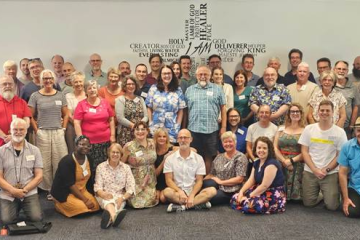It was a busy week this week thanks to Kids@CanBap so I reached into the sermon back catalogue and what came to hand was my sermon on Luke 4 …named after one of my favourite Christmas holiday films – Love Actually! (Now I recognise that Love Actually is a film that has not aged well; that is deeply riddled with sexist flaws, but like eggnog or Darrel Lea Christmas cakes, it’s hard to pass up at Christmas! As is preaching this sermon again – when the lectionary readings are Luke 4 and 1 Corinthians 13!)
And my favourite scene from Love Actually is – naturally – the one that takes place in church…. Video
But what I actually love about Love Actually is that all these interwoven stories (of people falling in love and failing in love and learning to love again) tell us that sometimes our frame for what love looks like is too tight – too narrow – that love does not always look like this:
Or this…
Or this…
For the story that speaks most powerfully and poignantly to me in this film is the one where Laura Linney’s character, Sarah, gives up her blossoming relationship with the gorgeous Karl (seriously, what is it about tall dark handsome men!) because of her love for her institutionalised brother. This too is love. Actually.
Over the last few decades, the church has slowly acknowledged how it failed many for whom it should have been caring. We have not shown love, in many cases, to our Aboriginal and Torres Strait Islander neighbours, or to children in our care, or to women or other groups whose voices have been silenced. And the time is inevitably coming – this is what I cannot believe the Baptist Association cannot see! – when we will also acknowledge how badly we have failed to love our LGBTIQ+ brothers and sisters. We have forgotten, as the late British rabbi and member of the House of Lords, Jonathan Sacks reminded us that, “the Hebrew Bible in one verse commands, ‘You shall love your neighbour as yourself,’ but in no fewer than 36 places commands us to ‘love the stranger.’” Our frame for who we have loved has been far too narrow.
Which is what the apostle Paul says to the church in Corinth (in these verses that also pop up at weddings!) He tells them their frame for love is far too narrow. “If our focus is on ourselves – our gifts and abilities – eloquence, foresight, insight, mountain-loads of faith, incredible acts of public service – we’ve missed the point,” he says. “Love isn’t about us. It doesn’t just feature our high points or focus on our good points. Love is about connection points – when we are prepared to move outside the frame – when we bring others into the picture.”
And sometimes this love does look extraordinary, but mostly it looks like this: people being patient; people being kind; people not being envious or boastful or arrogant or rude, people not insisting on their own way; people not being irritable, people not being resentful. It looks like a woman choosing to spend her time with her mentally ill brother. It looks like a church confessing it has failed to love and learning to love again. It looks like people courageous enough to discover, as Jonathan Sacks says, that people not like us are just people – like us.
“And do you know what,” says Paul. “Can I let you in on a secret? It might not be as sexy as those other things, but plain old ordinary love for others turns out to be far more amazing than fancy speeches or predicting the future or knowing the Bible back to front or being some sort of super disciple – it turns out to be braver and stronger and more resilient and more long lasting than anything. …The greatest of these is love.”
In our gospel reading, too, Jesus addresses the limitations of his hometown’s frame for love. He goes back to Nazareth, and on the sabbath, in the synagogue, stands to read the words of the prophet Isaiah:
The Spirit of the Lord is upon me…he has anointed me to bring good news to the poor…to proclaim release to the captives and recovery of sight to the blind, to let the oppressed go free, to proclaim the year of the Lord’s favour.
And from our reading today, we know the audience were all nodding, “Wonderful words! And doesn’t he read well! But hang on a sec. What does he mean, ‘Today this scripture has been fulfilled in your hearing?’ Who is he to proclaim God’s favour on the poor…on the oppressed? Doesn’t he know that the sons of carpenters belong in the workshop and the words of prophets belong on the page and the love of God belongs right here – with us!”
And like a strange precursor to the wedding in Love Actually, Jesus orchestrates a far less welcome scene. “Don’t you know,” he says, “God’s love is actually this…” And instead of flautists fluting, he flaunts the fact that although there were many widows in Israel in the time of Elijah, Elijah was sent to a widow in Lebanon, and then- like the blast of trombones – he blasts them, saying there were many lepers in Israel in the time of Elisha but none of them were cleansed except Naaman the Syrian.
“Open your eyes.” Jesus is saying. “Widen the frame. Love your neighbours. Love the strangers. Love even your enemies. This is what God’s love is.”
transition to
I was reminded of Jesus’ sermon as I heard another sermon this week – Rev Mariann Edgar Budde, the Episcopal Bishop of Washington, preaching as part of Trump’s inauguration. “In the name of our God,” she said, “I ask you to have mercy upon the people in our country who are scared now. There are gay, lesbian and transgender children in Democratic, Republican, and independent families, some who fear for their lives. [And] the vast majority of immigrants are not criminals. They pay taxes and are good neighbours. They are faithful members of our churches and mosques, synagogues, gurudwaras and temples.”
And then, resounding with Jesus’ words, came her conclusion, “May God grant us the strength and courage… to speak the truth to one another in love.…” To speak the truth to one another in love! For even those we disagree with most vehemently are people we are called to love. As Martin Luther King Jr said, “As you press on for justice, be sure to move with dignity and discipline, using only the weapon of love. Let no man pull you so low as to hate him.”
Let no man pull you so low as to hate him. Keep widening the frame for love.
Commentators have pointed out that these 15 verses – Jesus’ sermon and its reception in Nazareth – encapsulate Jesus’ entire ministry. He comes proclaiming, “The Spirit of the Lord is upon me” He demonstrates in his life and teaching what love is. And he is rejected. In fact, he is taken up a hill – it’s just a different hill (verse 29) – to be killed. But the love of God cannot be constrained or contained. It breaks through our resistance, our fear, our limited understandings, to show us, in love of neighbour, love actually, in love of stranger, love actually, in love even of enemies, love actually.
May this be a year in which all of us see and bring about a bigger picture of love.
Call to Worship
Luke 4:14
Jesus returned to Galilee in the power of the Spirit, and news about him spread through the whole countryside.
Prayer by Joshua Lane – Kanolu and Lardil man – appeared on the video last week among the group of Aboriginal and Torres Strait Islander Christian Leaders. Chaplain in the Queensland Juvenile Justice System.
Our Father, Our Creator,
We humbly come before you today acknowledging the weight of our shared history in Australia. We acknowledge that we are all made in your image and called to live in harmony with one another. Yet, as a nation we have fallen short of this calling, and ask for your guidance and wisdom to enable us to become agents of change in the pursuit of reconciliation with one another.
We pray for the courage to speak up for the marginalized and oppressed, and to be a voice for the generations that have suffered under the weight of racism and discrimination. May your love and grace inspire us to take action towards healing and reconciliation, and to work towards a future where all are treated with dignity and respect.
Help us to listen to the voices of those who have been silenced for too long, and to work together to see restoration and healing.
May we be guided by your love and grace, and may our actions be a reflection of your goodness.
May your Holy Spirit guide us towards a future where love, mercy, and compassion reign. We pray for your hand to be upon us as we work towards reconciliation, and we entrust our efforts into your hands.
In Jesus’ name we pray, Amen.
Prayer of Intercession
Loving and gracious God,
we pray today and we thank you today for the land in which we live.
We thank you for the freedoms we enjoy,
for the multitude of opportunities presented to each of us,
for a land of abundance.
Forgive us for our lack of creativity in protecting this nation’s beauty and sharing this nation’s bounty equitably,
for tarnishing our political process with greed,
for failing the needy.
Save us from that litany of destructive behaviours
Which the apostle Paul outlined:
envy, boasting, arrogance, rudeness, selfishness,
anger, resentment, wrongdoing
and all that would undo us.
Lead us instead to pursue love.
Help us, in a world of ‘me first’, to develop patience
Help us to show kindness to all – even to those with whom we find it especially difficult to be kind.
Help us to be humble, graceful and gracious
Help us in an over-serious and gloomy world to know real joy
because you help us overcome the world.
Grant us your courage and strength to suffer, to believe, to hope and to endure.
O God, raise our national vision.
We give you thanks for those recognised this Australia Day
for their compassion and their commitment to helping others
– Vanessa Brettell and Hannah Costello from here in Canberra,
Mabuigilaig (Mowbee-ug- ilee-ug) and Goemulgal woman, Dr Katrina Wruck, Brother Thomas Oliver Pickett
and Neale Daniher.
As Bishop Budde prayed
– May God grant us the strength and courage
to honour the dignity of every human being,
to speak the truth to one another in love
and walk humbly with each other and our God for the good of all people.
Good of all people in this nation and the world. Amen
Benediction – Brooke Prentis
May our footsteps, on these ancient lands,
remind us of creation and connectedness, in our search for truth.
May the Gum Tree, from its roots to its branches,
remind us to dig deep and reach high, in our action for justice.
May the Eagle, who soars in the sky,
remind us of the power, in our call for love.
May the expanse of the lands and seas, of the sky and stars,
remind us of God’s timing in our faith in hope.
May the Holy three, Creator Spirit, Lord God, Papa Jesus,
remind us of community.
So with grace, mercy, and peace, go in truth, justice, love and hope.
1 Corinthians 13:1-13
13 If I speak in the tongues of humans and of angels but do not have love, I am a noisy gong or a clanging cymbal. 2 And if I have prophetic powers and understand all mysteries and all knowledge and if I have all faith so as to remove mountains but do not have love, I am nothing. 3 If I give away all my possessions and if I hand over my body so that I may boast[a] but do not have love, I gain nothing.
4 Love is patient; love is kind; love is not envious or boastful or arrogant 5 or rude. It does not insist on its own way; it is not irritable; it keeps no record of wrongs; 6 it does not rejoice in wrongdoing but rejoices in the truth. 7 It bears all things, believes all things, hopes all things, endures all things.
8 Love never ends. But as for prophecies, they will come to an end; as for tongues, they will cease; as for knowledge, it will come to an end. 9 For we know only in part, and we prophesy only in part, 10 but when the complete comes, the partial will come to an end. 11 When I was a child, I spoke like a child, I thought like a child, I reasoned like a child. When I became an adult, I put an end to childish ways. 12 For now we see only a reflection, as in a mirror, but then we will see face to face. Now I know only in part; then I will know fully, even as I have been fully known. 13 And now faith, hope, and love remain, these three, and the greatest of these is love.
Luke 4:21-30
21 Then he began to say to them, “Today this scripture has been fulfilled in your hearing.” 22 All spoke well of him and were amazed at the gracious words that came from his mouth. They said, “Is this not Joseph’s son?” 23 He said to them, “Doubtless you will quote to me this proverb, ‘Doctor, cure yourself!’ And you will say, ‘Do here also in your hometown the things that we have heard you did at Capernaum.’ ” 24 And he said, “Truly I tell you, no prophet is accepted in his hometown. 25 But the truth is, there were many widows in Israel in the time of Elijah, when the heaven was shut up three years and six months and there was a severe famine over all the land, 26 yet Elijah was sent to none of them except to a widow at Zarephath in Sidon. 27 There were also many with a skin disease in Israel in the time of the prophet Elisha, and none of them was cleansed except Naaman the Syrian.” 28 When they heard this, all in the synagogue were filled with rage. 29 They got up, drove him out of the town, and led him to the brow of the hill on which their town was built, so that they might hurl him off the cliff. 30 But he passed through the midst of them and went on his way.


